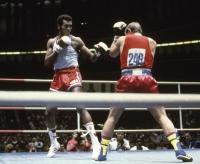USSR and Cuban dominance
Published in 20th-century / Contemporary History, Features, Issue 4 (July/August 2012), Volume 20
Three times (1972, 1976 and 1980) heavyweight gold medallist Teófilo Stevenson (who passed away just before this issue went to press)—one of a production line of highly skilled and successful full-time (state-sponsored) ‘amateur’ boxers from Cuba.
USSR and Cuban teams began to make their presence felt on the Olympic boxing medal tables from the mid-1950s and early 1970s respectively. Both countries had replaced the concept of ‘professional’ sport with a comprehensive egalitarian ‘sports for all’ philosophy. The Cubans developed a scientific planning system and technical coaching methodology in their boxing programmes. The outcome internationally was a production line of highly skilled and successful full-time (state-sponsored) ‘amateur’ boxers, embedded within the defence forces, universities, sports institutes etc. Genuine ‘amateur’ nations suffered accordingly when confronted with these ‘super’ athletes. In addition, with sport being one of the battlefields of the Cold War, suspicions of ‘political’ voting became a feature of international competition, especially when it came to the ‘medal stages’ of a championship.
















